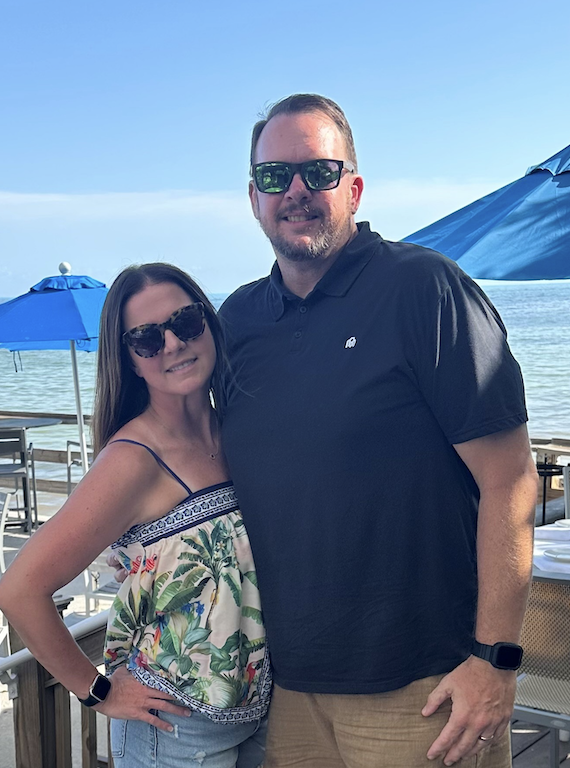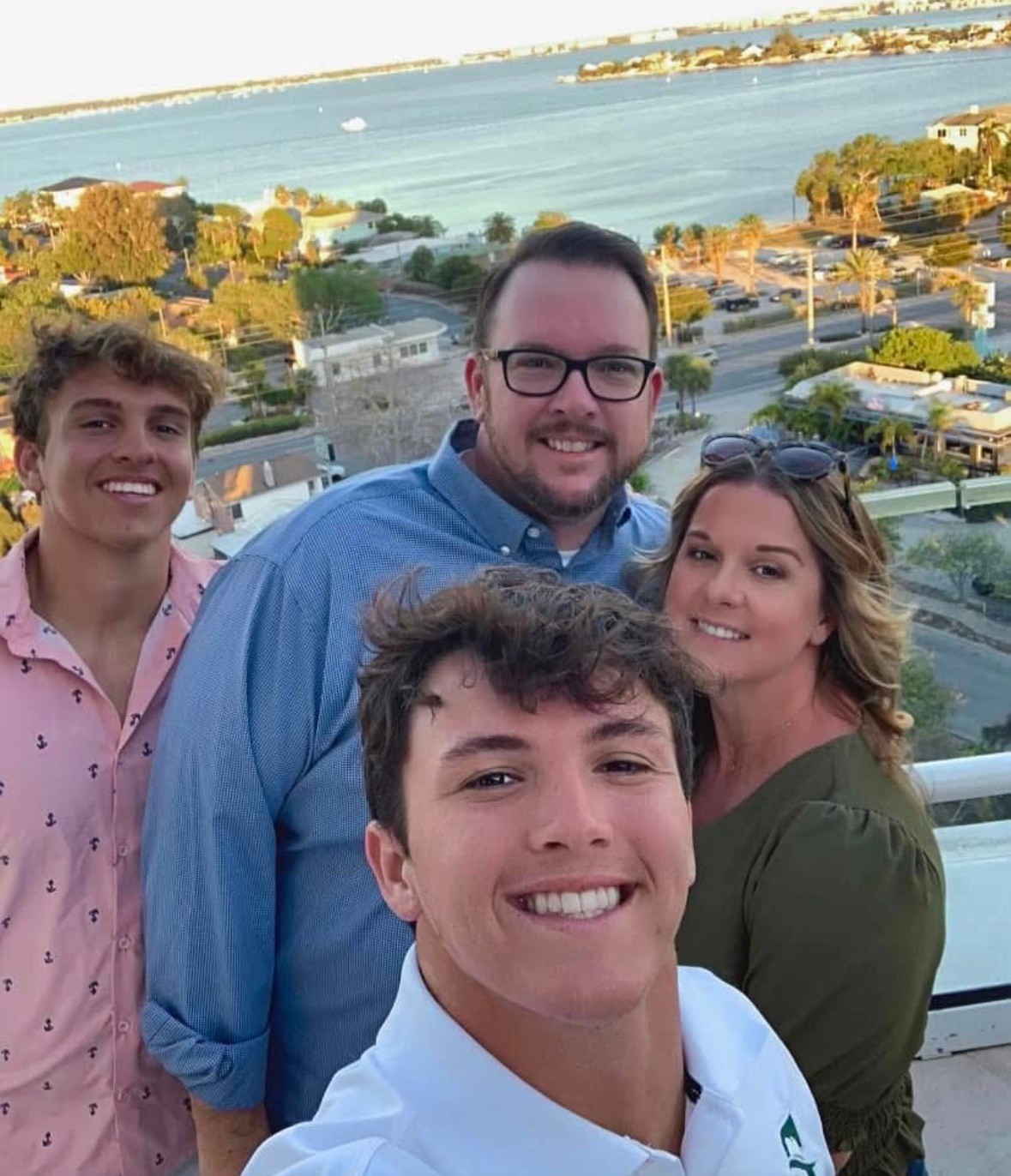
When Brian, a 49-year-old sales professional for Mercer, signed up for Hello Heart during a casual office lunch-and-learn, he never imagined the platform would one day play a critical role in his health.
Living in South Florida and standing 6'4", Brian had always been a self-described “big guy.” A former football player who still worked out regularly, he considered himself “reasonably healthy.”
So when Hello Heart’s digital health platform was introduced to his team, he didn’t see himself as someone who urgently needed it.
But as he recalls, “There was no harm, no foul, so I went ahead and signed up.”
The Hello Heart Monitor shipped to his house, but he didn’t open the package right away. He held off on tracking his heart health.
The Night Everything Changed
Later, on June 26th, 2025, Brian wasn’t feeling quite right. He’d been experiencing off-and-on symptoms all week: clamminess, heat, fatigue. Nothing major. As someone who occasionally experienced minor heart rhythm issues (and who chalked it up to the Florida summers and his size), Brian wasn’t overly concerned.
That night, after watching a movie with his son, the symptoms intensified. His Apple Watch was dead. His wife had just returned home from work when he told her he wasn’t feeling right. She asked him to check his heart rate, but neither had a working device on hand.
Then he remembered the Hello Heart Monitor.
“I grabbed it from the cabinet, synced it to my phone, and took a reading,” Brian recalls. “My blood pressure was 243 over 142, and my heart rate was in the 190s.”
The Hello Heart App didn’t just show him the numbers. It immediately urged him to take action: “Call 911 now.”
“That was the moment,” Brian says. “I was scared. I realized, if a heart health app is telling me I need emergency help, this is serious.”
A Life-Changing Decision
Brian and his wife rushed to the hospital. The emergency staff confirmed his vital signs were dangerously high. But the heart attack wasn’t officially diagnosed until the next morning, when doctors found a 100% blockage in his left anterior descending (LAD) artery — the one nicknamed the “widowmaker.”
He underwent an emergency procedure to place two stents in his heart. Thankfully, because he acted quickly, there was no permanent damage.
“My cardiologist told me that if I had gone to bed that night, I probably wouldn’t have woken up,” Brian says. “The Hello Heart app made me take it seriously in that exact moment. That changed everything.”
From Skepticism to Advocacy
Before his heart attack, Brian had been initially skeptical of digital health tools. But now, he’s a passionate advocate for tech-enabled tracking.
“I’m a believer. I told Bianca—the rep who introduced Hello Heart to our office—that she changed my life by getting me to sign up.”
Since the incident, Brian has made dramatic lifestyle changes. He lost 15 pounds in just one month. His entire family rallied behind him, clearing out the house of unhealthy foods. “It was like a crime scene,” he jokes. “No chips, no cookies, no ice cream. Just low-sodium turkey and vegetables now.”
New Habits, New Tools
These days, Brian uses Hello Heart daily. He logs his blood pressure one to two times a day and brings the data to his frequent doctor visits via the Hello Heart Clinician Report. “It’s great because it keeps a record for me. When my doctor asks about trends or patterns, I can just show him the app.”
His cardiologist — initially unfamiliar with Hello Heart — was impressed. “He said the tracking and reporting were really helpful. It gave him insights he wouldn’t have had otherwise.”
Brian has also started using other features in the app: weight tracking, exercise logs, and wellness insights. “It’s more than just numbers on a screen,” he explains. “It gives you advice, ideas, reminders. I even let it sync with my phone to track my steps.”
And his Apple Watch? “That thing is never dead anymore,” Brian laughs. “Chargers in the bedroom, on the desk, in the car… I’m not taking any chances.”
The Power of Prevention
Beyond the tech and numbers, Brian’s motivation is deeply personal.
“My family is everything. My kids, my wife — they were all over this. One son is a strength coach, the other’s studying to be a paramedic. They send me recipes, walk the aisles at Costco telling me what I can and can’t have,” he says. “And it’s because they want me around. I want to be around.”

The experience has changed how he approaches health — not just his own, but for supporting others, too. “I absolutely recommend Hello Heart,” he says. “Everyone has a blood pressure cuff. But this one talks back. It gave me the push I needed to make a life-changing decision.”
Bringing the Message to Others
Brian also believes more people should be aware of programs like Hello Heart, especially when they’re offered free through employers like Mercer’s parent company, Marsh McLennan.
“These tools only work if people know about them,” he says. “If Hello Heart hadn’t come into my life when it did, I might not be here to tell this story.”
Today, Brian’s story serves as powerful proof that health tech, when paired with the right timing and education, can change lives for the better.
Interested in using Hello Heart for your own health?
👉 Check Your Eligibility Here
Interested in learning more about Hello Heart for your team or clients?
Let’s talk about how we can bring this platform to your organization.
👉 Request a Demo
👉 Contact Our Consultant Relations Team: consultantrelations@helloheart.com
1. Gazit T, Gutman M, Beatty AL. Assessment of Hypertension Control Among Adults Participating in a Mobile Technology Blood Pressure Self-management Program. JAMA Netw Open. 2021;4(10):e2127008, https://doi.org/10.1001/jamanetworkopen.2021.27008. Accessed October 19, 2022. (Some study authors are employed by Hello Heart. Because of the observational nature of the study, causal conclusions cannot be made. See additional important study limitations in the publication. This study showed that 108 participants with baseline blood pressure over 140/90 who had been enrolled in the program for 3 years and had application activity during weeks 148-163 were able to reduce their blood pressure by 21 mmHg using the Hello Heart program.) (2) Livongo Health, Inc. Form S-1 Registration Statement. https:/www.sec.gov/Archives/edgar/data/1639225/000119312519185159/d731249ds1.htm. Published June 28, 2019. Accessed October 19, 2022. (In a pilot study that lasted six weeks, individuals starting with a blood pressure of greater than 140/90 mmHg, on average, had a 10 mmHG reduction.) NOTE: This comparison is not based on a head-to-head study, and the difference in results may be due in part to different study protocols.
2. Validation Institute. 2021 Validation Report (Valid Through October 2022). https://validationinstitute.com/wp-content/uploads/2021/10/Hello_Heart-Savings-2021- Final.pdf. Published October 2021. Accessed October 19, 2022. (This analysis was commissioned by Hello Heart, which provided a summary report of self-fundedemployer client medical claims data for 203 Hello Heart users and 200 non-users from 2017-2020. Findings have not been subjected to peer review.)